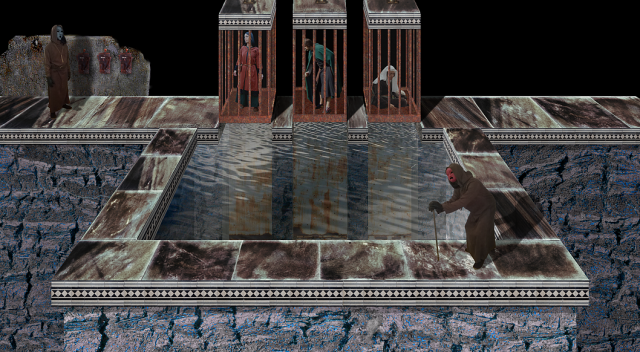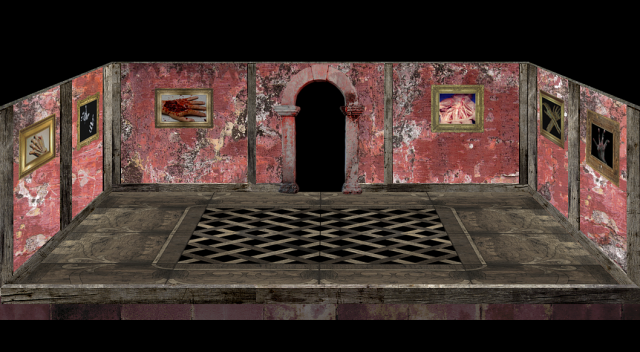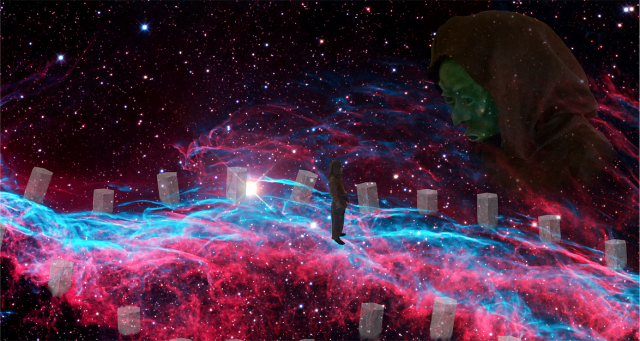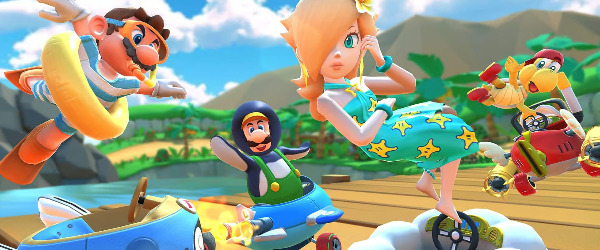Interview: Abstract Games Talks About Their Upcoming Adventure RPG Purgatory - Article
by
Tyler Treese
, posted on 14 March 2016
/ 5,734 ViewsWith so many games being released on PC, it can be difficult to stand out in 2016. That's why a unique visual style goes a long way, which is exactly what Abstract Games has with their debut title Purgatory: Echoes From The Void. Merging real-life objects with digital backgrounds, the adventure RPG has a distinct look that has garnered praise online.
To find out more about this intriguing PC release before its Kickstarter launches next month, we reached out to Abstract Games' Mario Laghos to learn more.
VGChartz' Tyler Treese: On your website you describe Purgatory: Echoes From The Void as a "adventure RPG with puzzle solving." That's a lot of genres rolled up into one game, so how would you explain the gameplay?
Mario Laghos: We really love RPGs, but we find ourselves disappointed when a good quest premise devolves into fighting through overly long dungeons and caves. We felt we could replace much of the combat, thus puzzle solving that takes inspiration from games like
Myst.
In order to tie the puzzles into the RPG elements we allow for alternate solutions to any given puzzle, and often the easier option is the more ethically questionable one. It's like risk vs reward but with ethics versus expediency. Moreover how you choose to solve any given puzzle, for example if you're a serial sadist, will have ramifications on your standing with other characters in the game world, and even open up, or alter certain areas of the world.
In addition exploration and adventure plays a large role, with a series of realms that can be approached in a nonlinear way, each with it's own hidden secrets to unlock and explore. We don't expect players to discover all of Purgatory's secrets even after several playthroughs.
We're also putting a lot of focus into the dialogue. We are weary of blocking progression with walls of text, so much of it is optional, and we are aiming for it to be fully voiced. We're incorporating complex dialogue trees that allow for in depth conversations with characters who feel real and don't just spout exposition.
We're also experimenting with a full motion video combat system, but that's in it's infancy as of this moment. It's important for us any combat isn't against swarms of faceless enemies, and instead focuses on pivotal moments, and each fight will have weight and consequence.
So in short the moment to moment gameplay is spent exploring, puzzle solving, discovering, and talking, with some combat too.
TT: You've mentioned that Purgatory is a "story driven" game. What kind of themes will the game deal with?
ML: Purgatory explores several themes, from the nature of good and evil and relative morality, to the value of a single life against a greater purpose.
We're not pushing any messages though, and are designing the world of Purgatory to allow players to give their own answers, through their actions, to these questions.
TT: The game's hub world, The Polis, is constantly changing due to player choices. Will players be dealing with simple good/evil type choices, or will it be more nuanced than that?
ML: Our choice system is built from the ground up not only to allow a nuanced approach beyond the good/evil dichotomy, but to present to the player with ethical dilemmas to which there are no easy answers, or even a 'good' solution.
For example, it may seem tempting to offer a starving beggar a loaf of bread, but when he is subsequently robbed and beaten for that same loaf, the harsh realities of Purgatory become strikingly apparent.
With regards to the reactivity of The Polis each of it's dwellers will have their own influence system, and respond well to different approaches, from manipulation to aggression. We're incorporating complex dialogue trees to allow for a number of different approaches to any given conversation. Gaining influence will open up opportunities to find out about a characters back story, or enlist their aid. However others impressions of you could diminish if you befriend their rivals, and will act against you, so in many ways it can be a diplomatic balancing act.
Furthermore, actions in the many disparate realms have rippling consequences in The Polis. Each time you return you'll find your actions have led to unexpected changes, from the death of a character, to a physical transformation of the town itself.
TT: When can we expect to see the first video footage for Purgatory?
ML: We've been really polishing our animation in recent weeks and feel we'll be ready to post our first video hopefully by the end of this week.

TT: You're going with a really cool art style for the game where you blend physical objects with digital backgrounds. How did you come up with this style, and what inspired this distinctive look?
ML: We wanted something that looked unique in the true sense of the word, and also had an otherworldly vibe. The combination of filmed actors implemented into a digital environment gives the world a transcendental feel, like an unreality of sorts, while still allowing for crisp visuals.
We aimed to create a world which was both unnerving, intriguing and contained elements of horror, while still allowing for vibrancy and colour. To achieve this we spent a long time concepting our visual style. Our notable inspirations include early 1920's silent films like The Golem and Metropolis, films like Eyes Wide Shut and 2001: A Space Odyssey, surrealist artists like Dali and Ernst, and stage performances of Ancient Greek tragedies like Oedipus. After amalgamating these different styles and adding our own ideas into the mix, we drew literally hundreds of concept drawings on paper, and after narrowing them down, began to construct them digitally.
TT: You've been detailing the prop production process over on your dev blog, and it seems like a lot of work. How difficult has it been to create these props, and how much time do they typically take to create?
ML: It's a process with a lot of trial and error, with several drafts of any given prop before we achieve our final result. It also requires a lot of experimentation, for example we've produced robes from old curtains, shoulder armour from toy boots, and transformed old alarm clocks into ancient artefacts. In that sense it is difficult, but it's also really fun coming up with new and innovative ways to produce props.
The production process can be lengthy, each mask for example must first be designed on paper, and we'll go through dozens of ideas until we find something we like. Then we'll sculpt on top of a paper mache base with clay and Plasticine, reinforce them with a fiberglass resin, and finally paint them and attach head straps.
We also spend a lot of time browsing yard sales and thrift shops discovering new objects to adapt and integrate, from old torches to lemon squeezers.
TT: I wanted to talk a bit about Abstract Games. How was the studio formed and what is your previous experience?
ML: Me and my co-developer Baxter are cousins, and we've had a shared love of gaming since the Dizzy series on the Commodore 64. Working together was a no brainer and we operate on the same wave length. While we've had a history of modding games, Purgatory is the first game we've produced and marketed publicly.
Baxter's background is primarily in art and music, and my own is in classical literature , so it's an unorthodox combination for a video game, but in many respects this has benefited the game exponentially, because our ideas and design are often unconventional. This means we're producing something outside the general formula of games, and the result is getting a great response.
TT: One of the keys to success with a small team is developing around your strengths. How are you tailoring Purgatory to your talents and has development seen any unexpected setbacks?
ML: We put a lot of focus into the visuals, game design, writing and sound, but with a game of this nature had to self teach cinematography, studio lighting, and prop production. While every things gone better than we ever expected lighting proved to be a particular issue when filming characters, and we went through several lighting set ups and dozens of takes and sprites before we got it right.

TT: You're currently set to release in late 2016. When did development start on Purgatory?
ML: While the ideas and concepts have been in discussion for around 5 years, development proper began around 5 months ago.
TT: Gives us your pitch on why our readers should keep an eye on Purgatory: Echoes From The Void!
ML: It's totally unique. Purgatory is a hand crafted world dripping with detail, it's a joy to explore and a true labour of love. We have deep choice and consequence in the style of Wasteland and Fallout, puzzle solving reminiscent of Myst and Broken Sword, and exploration akin to Zelda. The characters are complex, the dialogue expansive and the themes it explores are thought provoking.
But most importantly, it's what a game should be; fun to play.
Abstract Games can be found on Twitter over at
@Abstract_Games. More information about
Purgatory can be found on its official
website.
More Articles


























